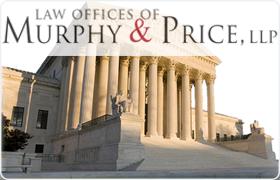Stockton Criminal Lawyer, Maryland
Sponsored Law Firm
-
 x
x

Click For More Info:
-
Murphy & Price, LLP
12216 Ocean Gateway Suite 500 Ocean City, Maryland 21842» view mapFederal & State Criminal Defense, DUI/DWI When Cases Are Serious, Look to Us
If you are under criminal investigation, or have been charged with a serious crime, we have lawyers ready and able to prevent loss of your freedom and reputation.
800-871-0830
Marc Alan Zeve
Misdemeanor, Felony, DUI-DWI, Criminal
Status: In Good Standing *Status is reviewed annually. For latest information visit here Licensed: 36 Years
Deborah A M Ullmann
Juvenile Law, Government, Family Law, Criminal
Status: In Good Standing *Status is reviewed annually. For latest information visit here
Diane Genevieve Cuilhe
Pharmaceutical Product, Social Security, Estate, Criminal
Status: In Good Standing *Status is reviewed annually. For latest information visit here Licensed: 18 Years
Beau H Oglesby
Tax, Traffic, Federal Appellate Practice, Criminal
Status: In Good Standing *Status is reviewed annually. For latest information visit here Licensed: 30 Years
Paul Timmons Haskell
Litigation, Traffic, Criminal
Status: In Good Standing *Status is reviewed annually. For latest information visit here Licensed: 31 Years

 J. Dennis Murphy Ocean City, MD
J. Dennis Murphy Ocean City, MD About UsMurphy & Price, LLP
About UsMurphy & Price, LLP FAQ'sCriminal Defense
FAQ'sCriminal Defense